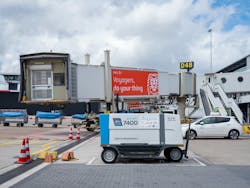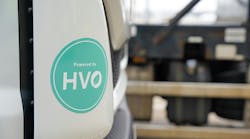Fuel generators at Schiphol are being replaced by 30 new electric ground power units (eGPUs), and the use of more electric systems that provide pre-conditioned air (PCAs) on board are being introduced — important steps towards emission-free ground handling at the airport. Aircraft parked at various piers at Schiphol will soon get their power from emission-free equipment thanks to the arrival of these new eGPUs, which are a kind of electric power bank for planes. The electric PCAs that are placed at piers E, F and G ensure that planes parked at the gate receive fresh air on board.
At the moment, 40 percent of the equipment used by ground handlers at Schiphol is electric. The arrival of more electrically powered equipment is an important step towards Schiphol's ambition to have an emission-free ground operation by 2030. Furthermore, replacing fuel power units and keeping auxiliary engines switched off helps us achieve the Labour Inspectorate's requirements to improve air quality.
"With the arrival of these eGPUs and additional electric PCAs, the aircraft's auxiliary engine can remain switched off more often. That's good for a variety of reasons. Thanks to these investments, CO2 emissions will decrease and the air quality on the apron, and thus the working conditions for staff, will improve. We are pleased that, together with KLM, dnata and Aviapartner, we have been able to create a pool where all employees on the apron can use available equipment," said Denise Pronk, responsible for sustainability at Royal Schiphol Group.
Power Bank for Planes
"The 30 new eGPUs are another great step towards equipping the entire apron at Schiphol with electric ground equipment in the future. By pooling these eGPUs, we can make optimal use of the ground equipment and emissions are significantly reduced. We are working together with the sector to introduce more eGPUs at Schiphol as quickly as possible and to find a solution for widebody planes, for which the e-GPU cannot yet be used," said Jorben Sprong, unit manager operational support apron services, KLM Ground Services.
"The introduction of 30 new eGPUs is aligned with KLM Equipment Services' strategy as pool manager and GPU owner to electrify the entire GPU pool by 2030. This process is running parallel to the installation of charging facilities at the airport that are critical for the use of eGPUs," said Paul Feldbrugge, manager fleet management and engineering at KLM Equipment Services.
The new eGPUs will be used around the aircraft stands on Pier C and on those on the inside of Pier D. The first 13 eGPUs are being installed in August and all 30 will be in service this autumn. Combined with the fixed power points offered at various piers, aircraft at the gate will be provided with emission-free power throughout Schiphol. Schiphol runs entirely on power from Dutch wind.
An eGPU powers aircraft on the ground. This is needed for on-board systems such as lighting and computers in the cockpit when the engines and auxiliary engines are switched off. The power bank consists of multiple batteries powerful enough for narrow body aircraft. Schiphol, in cooperation with ITW GSE and Nissan, designed and successfully tested the mobile eGPUs at the airport a while back. Before the arrival of these new units, there were already eight in use at Schiphol.
Electricity Provides Fresh Air On Board
By increasing the use of electrical devices that provide aircraft with fresh air, 50 percent of the larger types of aircraft will be able to leave the auxiliary engine off at the gate. This improvement is part of the action plan that Schiphol presented to the Human Environment and Transport Inspectorate to limit the use of auxiliary engines. Schiphol considers this a priority because it brings tangible improvements in working conditions and the health of apron employees.



